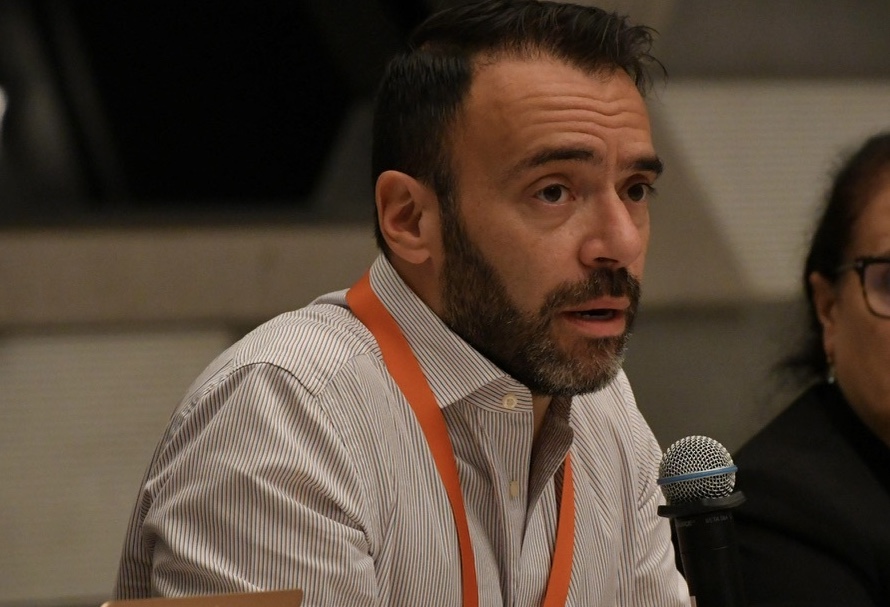First Statement of Konstantinos Komaitis to the United Nations on the Global Digital Compact
Delivered before the United Nations on the topic of the Global Digital Compact, addressing successes and lessons learned
First Statement of Konstantinos Komaitis to the United Nations on the Global Digital Compact
Share this story

BANNER: DFRLab Senior Resident Fellow for Global and Democratic Governance Konstantinos Komaitis speaking at an event.
The United Nations will hold a “Summit of the Future” in September 2024. The event, inspired by the UN Secretary-General’s “Our Common Agenda” report, is intended to reshape and modernize the world’s multilateral system to address the challenges of 2030 and beyond. As part of the Summit, the UN Secretary-General tasked his Envoy on Technology to initiate the negotiation of a Global Digital Compact (GDC) to “outline shared principles for an open, free and secure digital future for all.”
Global civil society and democratic governments alike have been closely following the subsequent GDC consultation processes and the UN Secretary General’s own policy brief on the subject. The GDC is currently being drafted, with the Swedish and Zambian chairs hosting consultations with member states, civil society, industry, and the technical community. On February 13, the chairs hosted a consultation for civil society. The DFRLab’s Resident Senior Fellow for Global and Democratic Governance provided a statement on February 13 as part of the chair’s consultation with nongovernmental stakeholders.
UPDATE MARCH 1, 2024: On March 1, Komaitis made a second appearance before the GDC consultation, the statement for which can be read here.
Dear Excellencies,
My name is Konstantinos Komaitis and I am a senior resident for global and democratic governance at the Digital Forensics Research Lab at the Atlantic Council. Today, I am speaking to you in my personal capacity.
First of all, I would like to thank the excellencies of Sweden and Zambia who have been facilitating an inclusive process since the announcement of the Global Digital Compact last year.
The internet is a byproduct of collaboration and, in the past twenty years, this collaboration has been embodied in the multistakeholder model. In fact, everywhere you look, you will see communities of stakeholders collaborating to address critical internet policy and technology issues.
Let me share some examples:
- For years, network service providers from around the world have been exchanging technical information and discussing implementation issues, which have been key to the resiliency and robustness of the internet.
- Supported by the Global Cyber Alliance, the Mutually Agreed Norms for Routing Security is a global collaborative initiative that provides crucial fixes to reduce the most common routing threats in the Internet.
- The Internet Engineering Task Force is a large, multistakeholder international community of network designers, operators, vendors, and researchers, civil society organizations and governments that develops open standards.
- The Global Network Initiative is a multistakeholder group of companies, civil society organizations, investors and academics who collaborate to advance freedom of expression and privacy in the ICT [information and communications technology] sector.
- The United Nations Internet Governance Forum (IGF) brings people together from various stakeholder groups to discuss digital public policy.
These are only some examples of collaborative efforts across the internet ecosystem. In some of them, governments are direct participants, while in others, they are at the receiving end.
The incredible pace of change of the internet is due to the continuing pursuit, development and deployment of technology and practices adopted to make the internet better. Cooperation sits at core of adapting to this continuous change.
But, what are the key lessons we have learned from these collaborative efforts?
- There must be a unified purpose: participants, no matter their background and views, must be united in their desire for an outcome.
- There must be commitment and focus: the experience of successful collaboration includes skillful contributions that move discussions forward towards a desired outcome.
- Forward action may require crossing boundaries: collaboration is more than the cooperation of individuals or organizations contributing their existing expertise. It ultimately requires actions that reach beyond traditional boundaries while leaning on existing processes.
- A successful outcome is measured in terms that are broader than individual gain: there is a desired “good” towards which people cooperate, which is measured across a broad range of participants rather than from the point of view of any single individual.
In last year’s submissions, stakeholders made it clear that the GDC process provides a great opportunity for additional discussion and stocktaking but, by no means, should it replace existing processes and efforts. I would like to reiterate this message and encourage the member states of the United Nations to work with and within these collaborative spaces.
Thank you for listening.
Cite this statement:
Konstantinos Komaitis, “First Statement of Konstantinos Komaitis to the United Nations on the Global Digital Compact,” Digital Forensic Research Lab (DFRLab), February 27, 2024, https://dfrlab.org/2024/02/23/statement-of-konstantinos-komaitis-to-the-united-nations-on-the-global-digital-compact/.

